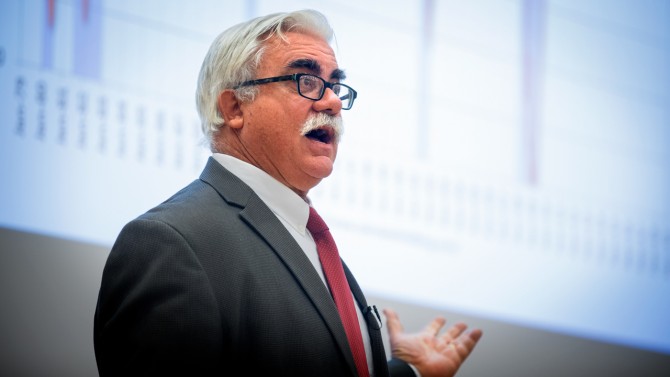U.S. economy will trot along at 2 percent clip in 2018
By Susan Kelley
In 2018 the U.S. economy will continue to grow at a steady pace of 2 percent to 2.5 percent, according to a Cornell economist. However, the low unemployment rate of 4.1 percent suggests that the current seven-year roll of economic growth could perhaps be coming to an end, he said.
“I’m not predicting a recession this year, but you have to start wondering, where’s the top of this business cycle? How much lower can we go in unemployment?” said Steven Kyle, associate professor in the Charles H. Dyson School of Applied Economics and Management.
Kyle made his annual assessment of the current national economy and predictions for the coming year Jan. 22 at the 2018 Agricultural and Food Business Outlook Conference.
There’s no magic number for when a business cycle ends, Kyle said. “However, things that can’t go on forever, don’t,” he pointed out.
The current cycle, which started at the bottom of the recession caused by the housing bust seven years ago, is unusual in that it never experienced the rebound growth spurt that often follows a recession, Kyle said. And we aren’t going to have one at this point, he added.
“We’ve just basically reverted to the same trend we had before and kept plodding along,” he said. “And I can’t help wondering if we’re at a peak right now. On the other hand, I don’t see what is going to turn things around.”
It’s entirely possible that some unforeseen event – perhaps one caused by an unpredictable U.S. Congress and president – could create a downturn, Kyle said. “But I don’t really see it. It seems to me that we’re just trudging along as we have been. I’m thinking we’re going to continue growing through this year.”
Household debt has now achieved what Kyle calls “the new normal” of historically low levels. But that will not hurt retail sales, which continue to rise. That’s good news, considering retail sales comprise 70 percent of gross domestic product (GDP). The housing market is more or less normal, he said.
A very tight labor market means we are likely to see wages start to go up, he said. “With stagnant real wages over the last 30 years more or less, there is bound to be a correction at some point, and this may be the beginning of at least a little bit of that,” Kyle said.
The tax cut passed in December puts the corporate tax rate more in line with those of other countries, and that’s not a bad idea, Kyle said. However, loopholes mean we’re getting less money for our taxes than other countries do; corporations are likely to pour tax savings into dividends, not investments in equipment and new plants; and the right time for a stimulus is during a recession, not a growth period, Kyle said. “We can’t expect to cut taxes of all kinds and not get the money from somewhere. We do need to fund the government, as we discovered during the shutdown. … Enough with the tax cuts.”
His other predictions for 2018 include:
- The unemployment rate will remain steady and is nearly as low as it will go. “We might see 3.9 percent if the GDP keeps growing,” Kyle said;
- Inflation will remain low but above the 2 percent target rate for the first time in five years;
- Interest rates will reach 2 percent by the end of 2018 but will increase only one-quarter of a percent at a time, the Federal Reserve has said;
- Fiscal policy will be marked by continued paralysis and short-term continuing resolutions; and
- For the exchange rate, higher interest rates mean a continued strong dollar, which will help dampen inflation rates as well as commodity prices.
The stock market will continue to climb, he predicted, because profits are high and companies are awash in cash, Kyle said. And with Republicans in charge of the government, corporations are likely to see neither greater regulations nor higher taxes, he said.
“This coming year, it’s hard to imagine [the stock market] will be as good as last year – although I’m not predicting a crash,” he said.
The “big unknown” for the coming year is how the investigation by Robert Mueller, the special counsel investigating whether President Donald Trump’s campaign colluded with Russia to sway the 2016 election, will affect the economy.
A constitutional crisis could erupt under at least two scenarios, Kyle said: If Trump fires Mueller before the investigation is finished or if Republicans in Congress, or a large portion of the population, refuse to accept the results of Mueller’s investigation, Kyle said.
Would a constitutional crisis trigger a recession?
“Your guess is as good as mine,” Kyle said.
Media Contact
Get Cornell news delivered right to your inbox.
Subscribe
